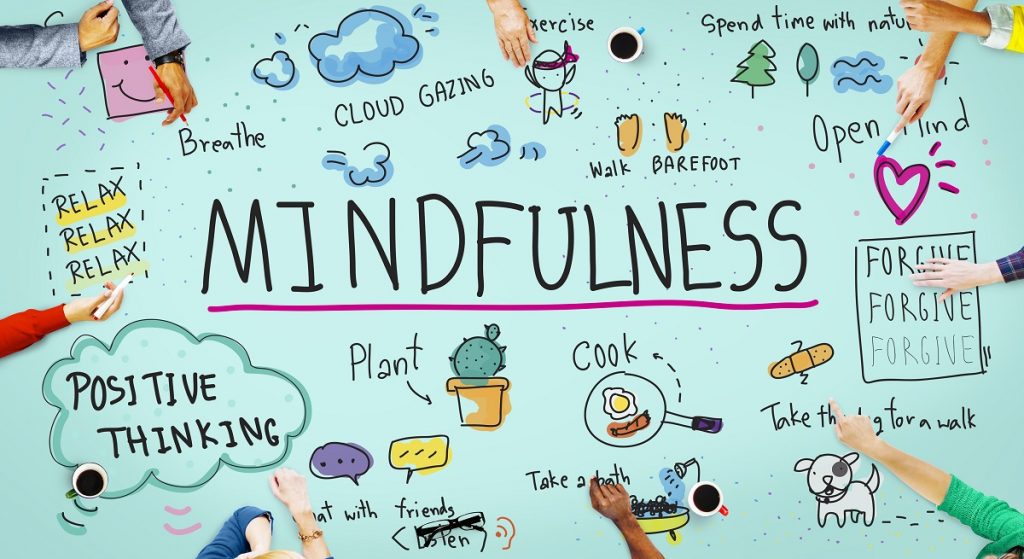In this blog we explore what “Mindfulness” is and why it is important to you and the businesses and organisations you lead and manage.
I should point out that although Mindfulness is often linked to spirituality (i.e. concerned with the human spirit rather than material things) it is in no way based upon religious beliefs or faith. So, if you are neither a spiritual person or a religious person, then Mindfulness remains just as relevant and helpful to you because it is simply about “being” rather than believing.

So, what is mindfulness?
“Mindfulness is the deliberate intention to observe the activity of the mind in a non-judgemental way – to step back and notice whatever arises in the mind without reacting to it”. As Jon Kabat Zinn explains “letting go of the tendency we all have to want things to be different from of how they are right now and allow things to be exactly as you find them and allowing yourself to be exactly as you are.”
Our whole life is only ever actually lived in the present moment – the NOW. Our minds, on the other hand, are increasingly trapped in the past or future. Trapped in a cycle of sadness and fear of loss – sad at what we have already lost or worried about what we may yet lose. Or, as Jon Kabat Zinn points out, entirely dissatisfied with what we have and craving for things to be different – a better job, increased wealth, a more perfect body shape. The list is endless of course and varies from person to person. We call this state of mind “unconsciousness” as we are not conscious of what is occurring in the present moment.
Unconsciousness is unhelpful in many ways. Firstly, it causes great harm and suffering for many and even illness in others especially where those thoughts are painful, unpleasant or cause anxiety and worry (e.g. depression, drug and alcohol addiction, workaholism). This constant “thinking” also means we have diminished awareness of the present moment and lack clarity of mind. We fail to notice the significance, value and joy of what is actually unfolding for us right here right now.
Secondly, it also means our behaviours and actions are driven by prejudices, fears and insecurities whether consciously or unconsciously. This manifests as anger, bitterness, impatience, frustration, jealousy, resentment, selfishness and being overly judgemental.
Mindfulness allows us to observe this happening and change our behaviours. It frees our mind from the tendency to be judgemental and overreact to these negative, painful or unhelpful thoughts (ruminating and catastrophising) by bringing our awareness back to the present moment. It also allows us to see that these thoughts are rarely reality. Instead, just the mind’s interpretation of reality based up on deep-seated beliefs, fears, prejudices, biases and life’s experiences.
So, what does this have to do with leadership & management?
Mindfulness offers us clarity of mind, higher levels of productivity and performance and improved relationships with others. It also better supports our welfare and those we lead and manage. Sounds amazing doesn’t it! However, this isn’t a trick or gimmick I promise. Let me explain what this looks like in practice with a few examples (there are many more!):
Clarity of Mind
When our mind is filled with painful, anxious or unwelcome thoughts, we are unable to concentrate on what we are doing. We are distracted. Not only that, we do not interpret things clearly as our mind is running scenarios and forming judgements about how the issue will impact us in the future (for good or ill). Compare this to facing life’s challenges using the full extent of our skills, knowledge and experience in a calm and focused manner.
Just think about it, would you expect to make your best decisions when anxious, upset and fearful of the consequences?
High-level Performance, Productivity & Creativity
When we are mindful, we bring the full extent of our intellect and the experience to bear on the matter at hand in a calm and focused manner. There is no distraction or second-guessing what may or may not happen. Professional athletes call this being in the “flow” or the “zone”. It is simply mindfulness in action.
When mindful, we problem solve effectively by taking the time to better understand the issue without jumping to conclusions, making assumptions or being overly judgemental. We are far more likely to complete the jobs we start, identify which activities are of most value, willing to make the tough calls and importantly be able to assess risk in a far more measured and balanced way.
Improved Relationships with others
Mindfulness allows us to feel empathy and compassion for other people. Once we are free of our own fears, desires, prejudices and biases, we are far more open with other people – open to differing opinions and ways of doing things and more willing to accept the fact that other people will have motivations, needs and expectations that differ from our own.
We are then able to communicate and work with other people far more effectively without overreacting or being excessively judgemental. Avoiding anger, frustration and impatience and, instead, behaving with sincerity, integrity, compassion and tolerance builds trust which is the foundation of all strong relationships.
Resilience and tolerance to stress
Stress and anxiety can galvanise us into action and motivate us to achieve great things. However, when we are feeling stress and anxiety most of the time without relief then misery and suffering soon follow. For many of us, our time at work can be incredibly stressful and a constant cause of worry. Deadlines, mistakes, complaints, excessive workloads and even the fear that we may lose our job! When stress becomes unmanageable, we see deteriorating performance, increases in absenteeism, fatigue, high-staff turnover (robbing the organisation of valuable skills) and a lack of enthusiasm or willingness to engage.
Mindfulness offers us the tools we need to better manage our own pressure and stress. With our actions and decisions flowing from clarity of mind rather than fear we are able to problem solve objectively and be far more accepting of things we may not be able to control or change even when they are difficult or unpleasant. Better able to say no, more willing to ask for help and capable of finding solutions to the most complex problems.
As we are far more attuned to the needs of other people, we are also better able to recognise the factors and causes of stress and anxiety in our workplace and put in place processes and ways of working to fix problems that exist or, better still, avoid them altogether.
Well, that sounds simple enough. Sign me up!
Sadly, being and remaining mindful isn’t easy. For many of us, far from it! 21st century life seems hell bent on dragging us back into unconsciousness. Just watch those adverts on TV and Social media telling us the grass is greener over there and tell me I am wrong! Or watch the news and see how our fears and prejudices are massaged and constantly exploited to drive ratings.
I also understand that this may seem very confusing, challenging or for some entirely bonkers. I’ve been consciously practising mindfulness (with varying degrees of success I should add) for over a decade and it still remains a challenge to me in many ways despite being fully committed to its practice and fully accepting of the benefits it extols.
However, practice makes perfect! The more we become aware of our mind wandering back to those unhelpful and painful thoughts, the greater our capacity to accept those thoughts and associated feelings without overreacting, being judgemental or becoming overwhelmed and anxious. Our mindful awareness reminds us that not all thoughts are reality and it is just the mind doing what the mind does!
Finally, I appreciate that I may have left you with more questions than answers. However, I am happy to answer the questions you would love to ask (e.g. how do I practice Mindfulness, how can you plan if you are not allowed to think about the future) and will be writing further on this topic over the coming months.
